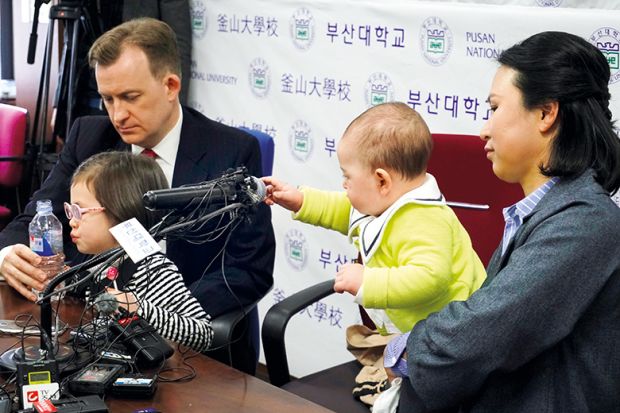Academics can feel uneasy about interacting with the media. Whether it is fear of being misrepresented, battling against a world that has “had enough of experts” or anxiety that your live BBC television interview might be crashed by your two inquisitive children, the prospect of thrusting yourself into the public realm can seem daunting.
However, as a recent report from ExpertFile, a platform that links journalists with researchers, points out, the world needs to be able to turn to trusted advisers “to examine, explore, debate, understand and address the many issues that contribute to human advancement and progression”.
One of the most important sources of expertise rests within academic institutions, and yet vast “clusters of expertise remain hugely untapped”, it says.
The report examines how some of the UK’s most media-active academics have been developing their media skills and their ways of working with journalists.
Peter Lee, a professor of applied ethics at the University of Portsmouth who contributed to the report, specialises in the ethics of drone warfare. He spoke extensively to the media last December when the intrusion of drones at Gatwick airport grounded hundreds of Christmas travellers. Professor Lee acknowledged that it can be easy to simply put your head down and get on with work, especially given all the pressures that today’s academics face.
However, it is important not to lose sight of the wider context, he told Times Higher Education. “If what I’m doing doesn’t inform and educate and have an impact, then what’s the point?”
Professor Lee said academics who are unsure of how to talk to the media should contact their university to find out what training is available. “People often aren’t aware that it exists,” he said. Some universities are also able to arrange for editors from different media outlets to come in and provide training themselves.
“If you can’t do the full training, at least do some practice,” Professor Lee said. “Get used to hearing your own voice.”
He advises academics to focus on non-professional participants in news programmes and study what they do. “Watch the academics who have been consulted as experts. Familiarise yourself with the format,” he said.
Scott Lucas, professor of international politics at the University of Birmingham, another contributor to the report, has appeared regularly on UK and US television and radio to discuss politics and current affairs. He is also editor of EA, a website specialising in news coverage and analysis of Iran, Syria and the wider Middle East. He recommends that academics take a dialogue approach when engaging with the media and avoid preaching. “It shouldn’t be: ‘I am an expert, therefore listen to what I have to say.’ Everyone brings something to the table,” he said.
This advice is particularly pertinent in such fractured times, he added. “The internet has broken down a lot of old hierarchies…it’s important not to come in and claim superiority.”
When engaging in the public sphere, an academic who encounters someone who is misinformed or ignoring evidence has a duty to establish the facts while, crucially, respecting other people’s views, Professor Lucas argued.
“Equally, if there is disinformation out there, it is important that you quite clearly say, ‘This is disinformation.’ I don’t shy away from knocking back what [Donald] Trump says. I say, ‘That’s a lie’ – but I am sure to back up what I am saying with facts,” he added.
And as for dealing with Twitter trolls? “Never take yourself too seriously on social media,” advised Professor Lucas.
Professor Lee said that it can be uncomfortable for academics to engage with the media because interviews are “often set up almost as this confrontational dialogue, and that’s uncomfortable for some academics”.
“But it doesn’t have to be as crude as that,” he continued. “There is a place for us providing a perspective – as long as we don’t act as if it’s the only perspective.”
Professor Lee said his tactic was to give whichever media outlet he talks to the names of people who fundamentally disagree with him. “Then I am able to soothe my conscience by the fact that both sides have been represented.”
Another worry for academics is the fear of making a mistake. Professor Lee said the important thing is to try to accept that part of talking to the media is trial and error and that the news will swiftly move on.
“Life happens,” he added. “It’s happened to me: I’ve thought, ‘Oh I wish I had said this or that.’
“One of the things I do is to find people whose judgement I rely on, such as my university’s press office or colleagues, to give constructive and honest feedback, so next time can be better.”
POSTSCRIPT:
Print headline: Step up and speak
Register to continue
Why register?
- Registration is free and only takes a moment
- Once registered, you can read 3 articles a month
- Sign up for our newsletter
Subscribe
Or subscribe for unlimited access to:
- Unlimited access to news, views, insights & reviews
- Digital editions
- Digital access to THE’s university and college rankings analysis
Already registered or a current subscriber? Login









